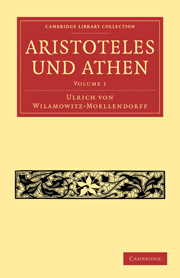10 - Zweck und bedeutung des buches
Published online by Cambridge University Press: 05 October 2010
Summary
Was ist die Politie?
Wir hatten uns in unsern träumen dieses buch gewünscht, auf dass wir eine autheutische belehrung dartüber erhielten, was der athenische staat gewesen sei. wir mussten so oft mehrdeutige auszüge daraus als die beste überlieferung anerkennen, wir waren gewohnt, in Aristoteles den unvergleichlichen an wissen und an urteil zu verehren, dass der wunsch sich mit notwendigkeit einstellte: o dass er doch zu uns sprechen könnte. der traum ist wahrheit geworden: er spricht zu uns. als das neue licht erschien, musste jeder zunächst geblendet sein; bald aber, unheimlich bald, wurden die verschiedensten urteile laut. sie waren durch drei factoren gebildet, alle von einem stark subjectiven charakter, den eindruck des neuen buches, die autorität des verfassernamens und die vorstellung, die sich der urteilende von der attischen geschichte vorher gebildet hatte. durch die combination so variabler factoren lassen sich noch eine anzahl anderer wahrsprüche über das neue buch gewinnen; aber die vorliegenden könnten genügen, um einem von fern herantretenden das ganze buch zu verekeln. was sowol als eitel gold wie als eitel kot bezeichnet werden kann, wird wol überhaupt nichts besonderes sein. dem gegenüber verlangte die wissenschaft zunächst, das buch wie es ist zu verstehen. der erste text konnte nur ein provisorischer sein; die erste übersetzung war es noch mehr: trotzdem formulirten schnellfertige historiker ihr urteil. was auf solchem boden errichtet wird, braucht man nicht erst anzugreifen, das fällt von selbst ein.
- Type
- Chapter
- Information
- Aristoteles und Athen , pp. 308 - 381Publisher: Cambridge University PressPrint publication year: 2010

